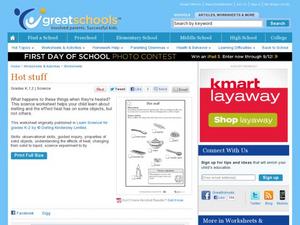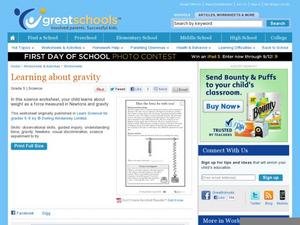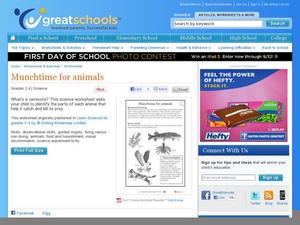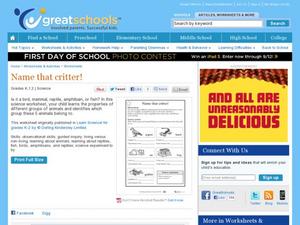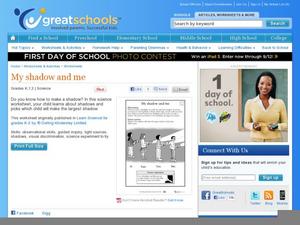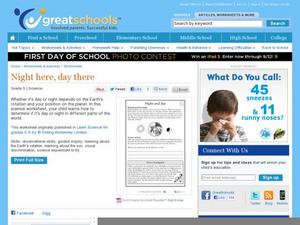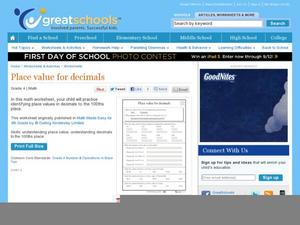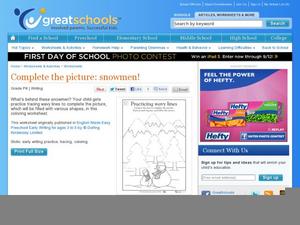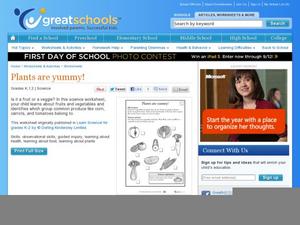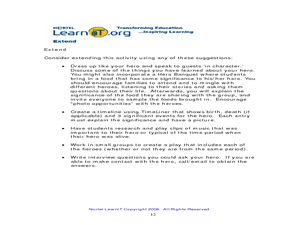Curated OER
Food chains at sea
Fifth graders interpret a table of data about food chains in the ocean. They create a food chain to represent the information on the table. Periwinkles eat seaweed, and crabs eat periwinkles - so who eats crabs? Extend the activity with...
Curated OER
Getting nosy
A nose knows! Connect animals to their noses with a fun science activity. Animals include elephants, rats, pigs, and even humans. For a science exploration, kindergartners answer questions about what they can smell. A great addition to...
Curated OER
Hot Stuff
Very young scientists who are learning about solids, liquids, melting, and freezing will use this worksheet to identify things that would melt if put in a warm place. There are eight objects altogether, and learners place a check mark...
Curated OER
Learning about gravity
Learn how to measure weight with newtons in a science experiment about gravity. After they read a short paragraph about force, fifth graders draw an arrow to indicate which way a spring is being pulled. Next, they survey their family...
Curated OER
Munchtime for animals
Which animals eat meat to stay alive? Third graders group fish, hawks, and cats into carnivores and herbivores. An extended activity prompts kids to cut out magazine pictures of different animals according to the foods that they eat.
Curated OER
Name That Critter
Young learners classify five different animals into their proper category. The animals pictured are a pigeon, a lizard, a cat, a frog, and a goldfish. Pupils are also asked to tell why they know it's a certain kind of animal. An...
Curated OER
My Shadow and Me
Practice making shadows with a kindergarten science experiment. After deciding which picture would represent the biggest shadow, kids use a flashlight to experiment with their own shadows. For extra fun, have kids mark their shadows...
Curated OER
Night Here, Day There
Explore astronomy with a lab sheet for fifth grade scientists. After reading a short explanation about the earth's rotation, they solve a word problem about the differences in times across the world. Next, they make a model of the solar...
Curated OER
Plants have needs, too!
Plants can die if they don't get enough sunlight and water. Kindergartners observe a picture of a hanging plant and grass under a tree, and interpret which each plant has died. Next, they grow watercress seeds in wet cotton to compare...
Curated OER
Ring-A-Ding-Ding!
What sound does metal make when you hit it? Kindergartners and first graders conduct an experiment about the properties of metal. First, they draw a line between metal items and descriptions of each. Next, they use a magnet to see which...
Penguin Books
An Educator’s Guide to Chraisma by Jeanne Ryan
Often, science fiction makes a lot of connections to real life. An educator's guide for the novel Charisma by Jeanne Ryan, has readers discuss many of the real-life issues that come in the text. A brief summary helps garner interest...
Curated OER
Multiples of 6 #2
Count by six with these helpful activities. After completing number sequences and multiplication problems from the six times table, third graders solve problems that are written out at the bottom of the page. An excellent way to work on...
Curated OER
Place Value for Decimals
Are your fourth graders having problems with decimals? Help them identify the place value of various numbers. Here, they describe what happens to the value of different numbers, as well as select numbers with given values in the tenths...
DK Publishing
Subtraction Practice #3
Reinforce subtraction skills with twenty problems, all subtracting two-digit numbers from three-digit numbers. An additional five problems at the end of the page include decimals to the hundredth place. Great as a homework assignment or...
Curated OER
Complete the Picture: Snowmen!
Finish the winter wonderland with your preschoolers. They trace pine trees and the tops of mountains to complete the snowy drawing. Have them color their paper and display the drawings during a winter unit!
Curated OER
Growing
Growing is part of being a living thing. Kindergartners decide which illustrations represent the life cycle of a living thing, then put a check mark next to the correct pictures. They then examine their own growth on a height chart.
DK Publishing
Cubes of Small Numbers
Now that geometers know how to solve for square units, can they solve for cubed units? Explore this concept as scholars examine four cubes to solve for volume in each. A detailed example explains this process, but you may consider asking...
Curated OER
Sorting
Young scholars explore how to logically sort and store information in order to make it easy to manage and easily retrieved. They explore methods they can use to organize and manage information.
Curated OER
The Spanish Belief in Justice and Values
Fifth graders study "justice" and "values" as illustrated through fables. The determine that some of the fables in the U.S. are relatively similar to those fables in other parts of the world. They write and illustrate their own fables.
Curated OER
Measuring Animal Sizes (and Relative Sizes in our Animal Environment)
Students discover the actual size and weight of many insects and animals. In this biology lesson, students investigate animals and insects to determine their actual weight and size. In groups, students create an animal or insect of their...
Curated OER
Food for thought
Cake has to be good for something, right? Different foods are used by our bodies in different ways. Learners will first read about what fats, proteins, fruits, and vegetables do for the human body. They will then put each of food shown...
Curated OER
Magnets are forceful
You could use this worksheet two different ways. As is, or you could have learners actually do the experiment shown. They are to determine which magnet is strongest by counting the number of paper clips hanging from it. Why not get five...
Curated OER
Plants are yummy!
Is it a fruit or a vegetable? Youngsters place an F next to each fruit they see and a V next to the vegetables. Corn is tricky. It is a grass, so it's actually not a fruit or a vegetable, but a grain!
Curated OER
Heroes and Their Characteristics, Past and Present
Students create a PowerPoint presentation. In this Internet research and technology lesson plan, students pick a hero to research on the Internet. After conducting research, they create a PowerPoint presentation on the hero of their choice.


